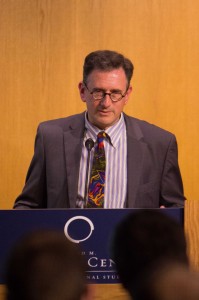A freelance British journalist and Middle East correspondent spoke on the incorrect and sensationalized behavior of journalists reporting on Middle Eastern topics at the Kennedy Center Feb. 27.

Matthew Kalman is a graduate of Cambridge University and has been a foreign correspondent living in Jerusalem since 1998. He has worked for a variety of major news sources, including Time Magazine, the Boston Globe and USA Today. Ancient scripture professor Kent Jackson introduced Kalman at the symposium, which was sponsored by the Ancient Near Eastern Studies Department and the BYU Jerusalem Center.
“One time he offended one of the journalism majors,” Jackson said, deferring to Kalman for approval. “He doesn’t always say nice things about how Western journalists do journalism in the Holy Land.”
Kalman’s primary point of discussion, and his main complaint with the world of journalism, is a phenomenon that Kalman refers to as “Parachute Journalism.” Parachute journalism is an unspoken practice among journalists, in which they enter a Middle Eastern country, report on information that they know little about, take pictures of what appear to be war-torn locations with people who appear to be terrorists and then hop on a plane back to their homes, having reported inaccurately and with a sensationalized edge.
He prefaced this definition with an illustration of the news media in 2010 around the time that the “Arab Spring” began.
“If you go back to the newspapers, media, social media, video, web, etc.., in 2010, you’ll find thousands of words of analysts and commentators and people predicting and explaining what as going to happen in the Middle East in the next years,” Kalman said. “And go back to 2010 and see how many that actually correctly predicted the Arab spring. The answer is zero; nobody saw it coming at all.”
Kalman believes that too many of today’s news reporters are trying too hard to report on the future and are failing at it.
“There is a Talmudic saying that, ‘With the destruction of the second temple the power of prophecy was taken away from wise men and given to children and idiots,'” Kalman said in jest. “I think that reporters should try reporting instead of trying to be prophets, they might do a much better job.”
Journalists, in Kalman’s opinion, often have trouble coming to terms, or accepting, the fact that their jobs are “parasitic.” Kalman illustrated to his audience that his wife is a teacher who works to help turn young children’s lives around, and his daughter is a paramedic who saves people’s lives on a daily basis. However, he is journalist who contributes very little to society, yet he reports on those people who do. To Kalman, this explains why many journalists wish to parachute into the Middle East and look like journalistic heroes.
“There is an attraction of Israel and Palestine to foreign correspondents,” Kalman said. “It’s attractive because we like to look like heroes and important people.”
The problem is that these journalists who know little about the country, the culture and what’s truly going on are reporting incorrect information to the rest of the world. Kalman recounted a story about a famous female CNN news anchor who reported on the death of Yasser Arafat. He explained that she was shuttled in on a jeep, replaced the anchor that was already there working and almost immediately went live with CNN. Kalman explained that as he watched this unfold he noted that the three major points she made were almost entirely inaccurate.
“I was thinking, what are you doing here? Have you parachuted in to tell us nothing, or tell us something that’s inaccurate? Why not let the guy who’s been here all night collecting information explain it,” Kalman said.
Kalman’s speech culminated in an explanation of the clash between journalist’s need to report accurate information and the need to maintain reader and viewership, and unfortunately, the latter is winning, resulting in less accurate journalism in the Middle East. This is because of both the need for sensational news stories but also because journalists aren’t taking the time to learn about the various Middle Eastern cultures.
“Imagine that a Russian speaking reporter lands in Texas and only speaks Russian and proceeds to analyze, commentate and report on American politics; and that’s the situation that we have in the Middle East,” Kalman said.
Kalman explained that things in the Middle East aren’t nearly as bad as we are being told. They have a culture of courtesy, respect, and honor; the economy in many areas has improved substantially since 2010 and peaceful lifestyles are very prevalent. However, Western journalists have opted to portray this area of the world as a perpetual war zone, not only for their own journalistic needs, but also because they parachute in and fly out in such quick intervals that they are unable to track any of the real and positive changes that are occurring.
Kalman recently published and co-authored a book with Welsh journalist Matt Rees, entitled “The Murder of Yasser Arafat.”




